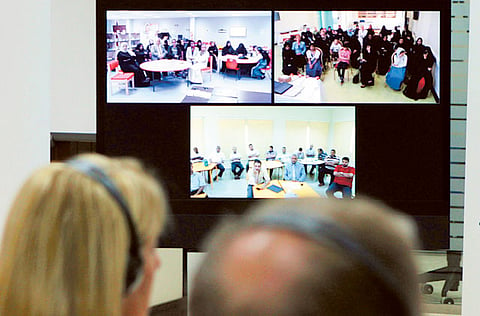More public schools to introduce technology-based learning
Abu Dhabi Education Council promotes interactive learning using digital devices

Abu Dhabi: Following the successful implementation of a pilot project to introduce technology-based learning in public schools, education officials yesterday announced that up to nine more schools would apply the iClass initiative in the coming academic year.
In efforts to facilitate iClass that uses digital devices like iPads, laptops and computers to enhance learning experiences, nearly 7,000 devices have already been distributed among public school pupils in the emirate of Abu Dhabi, said Dr Mugheer Al Khaili, director general at the Abu Dhabi Education Council (Adec).
“We hope to eventually introduce iClass at all public schools, and will be distributing nearly 4,000 more devices before the start of the 2012-2013 academic year,” he told Gulf News.
Pilot phase
In the pilot phase that began in September 2011, nearly 300 Grade 3 and 4 pupils enrolled at six schools in Abu Dhabi began using tablets, computers and electronic whiteboards for activities like video conferencing and interactive learning within the classroom.
In the meantime, a communication network has also been established to connect all public schools in the emirate, Dr Al Khaili announced.
“We do not intend to eliminate textbooks as a source of learning, but we will work to increase the use of digital devices that help make learning more engaging,” he added.
When asked about the risk of technological and Internet misuse on the devices, Dr Al Khaili said that both parents and teachers had been advised about ways to monitor children’s access. Officials also confirmed that pupils’ devices had been connected to teachers’ laptops for rigorous observation.
“We spoke to parents about not leaving children to access the Internet unsupervised. Within the classroom, ensuring that children do not get distracted or visit inappropriate websites is part of a teacher’s usual responsibility. In fact, it is just the same as keeping children focused in a classroom without technological tools,” said Markus Packalen, a Grade 2 teacher of English, Science and Math at the Al Ameen Boys School in Abu Dhabi.
Bridging digital divide
Badriya Saeed Al Hosani, a Grade 5 Arabic language teacher at the school, said that certain interactive tools had also made it easier for her to convey complex matters or tasks.
“For example, pupils usually face difficulty in writing creative stories. However, allowing them to brainstorm via video conferencing excited many pupils, and they were then able to generate better ideas and schoolwork,” Badriya said.
Packalen added that the introduction of iClass had also helped bridge some of the digital divide for schoolchildren.
— With additional inputs from Maisoon Mubarak, Intern at Gulf News

![Social media claims of cancellations dismissed; official updates to be shared through authorised channels. [Illustrative image]](http://media.assettype.com/gulfnews%2F2025-11-15%2Fx2mp12df%2Fexam.jpg?w=320&auto=format%2Ccompress&fit=max)

